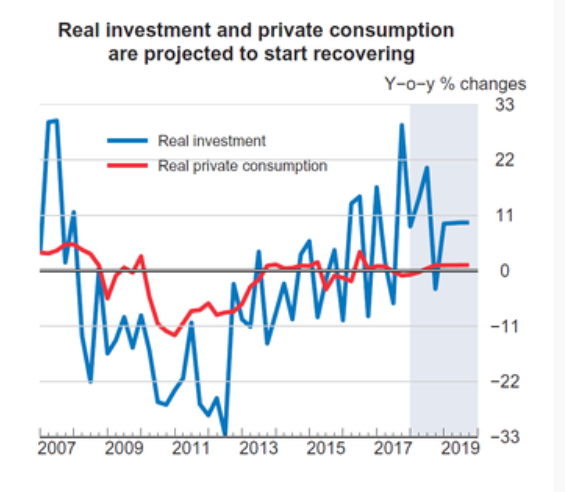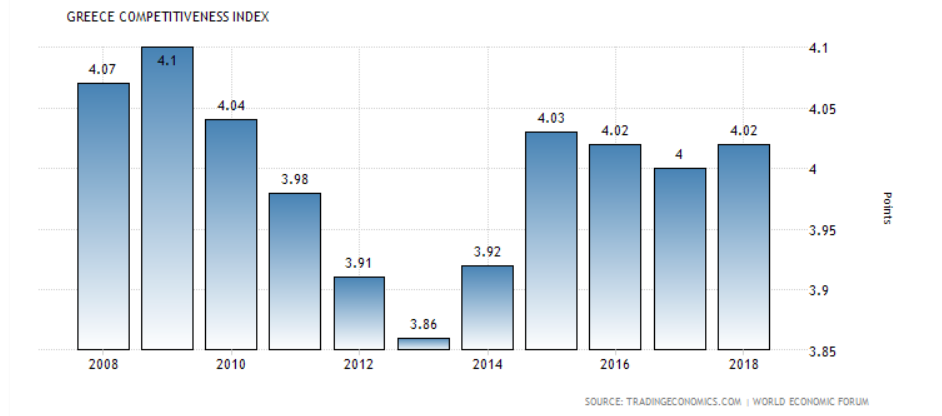
THE NEW GREECE
All eyes are on the health of the Greek economy as the August bailout exit nears. On 5 May, the ECB (European Central Bank) released the results of banking sector stress tests, which gave the country’s major lenders a sufficiently clean bill of health. The result could allow EUR 20 billion in bailout funds set aside for the sector to be put to other use, which would be good news for Greek policymakers. However, the tests were less severe than earlier versions, and the lenders are still weighed down by large amounts of non-performing loans. Other economic data, meanwhile, has been mixed recently. Industrial production rebounded solidly in March, but the unemployment rate crept up in February. A final review of the bailout is slated for mid-June, and the government is in the process of completing a list of creditor-mandated measures, including privatizations and energy market reforms, to ensure a positive outcome.
A recovering labor market and strengthening sentiment should boost the domestic economy this year. GDP growth is projected to rise to 2.3% in 2019 and exports will be the main driver of growth, benefitting from rising external demand and improved competitiveness. Investment and private consumption will recover as confidence rebuilds, following improved fiscal crediblity. Continuing high excess capacity will limit price and wage pressures.

Source : OECD (Organisation for European Economic Cooperation)
Industrial production expanded a working-day-adjusted 1.9% annually in April, accelerating from March’s revised 1.2% expansion. The increase was chiefly driven by a rebound in manufacturing output.
FocusEconomics Consensus Forecast panelists see industrial production expanding 2.2% in 2018, which is down 0.4 percentage points from last month’s forecast. In 2019, the panel sees industrial production growing 2.5%.

About competitiveness index, Greece scored 4.02 points out of 7 on the 2017-2018 Global Competitiveness Report published by the World Economic Forum. Competitiveness Index in Greece averaged 4.01 Points from 2007 until 2018.
The most recent 2017-2018 edition of Global Competitiveness Report assesses 137 economies. The report is made up of over 110 variables, of which two thirds come from the Executive Opinion Survey representing the sample of business leaders, and one third comes from publicly available sources such as the United Nations. The variables are organized into twelve pillars with the most important including: institutions, infrastructure, macroeconomic framework, health and primary education and higher education and training. The GCI (Global Competitiveness Report) score varies between 1 and 7 scale, higher average score means higher degree of competitiveness. This page provides the latest reported value for – Greece Competitiveness Index – plus previous releases, historical high and low, short-term forecast and long-term prediction, economic calendar, survey consensus and news.

Sources : focus-economics.com – tradingeconomics.com – economist.com – oecd.org – statistics.gr
DISCLAIMER
This publication must not be regarded as offering a complete explanation of the investment tax, legal, and other type of matters that are contained within this publication.
Authors are not responsible for the results of any actions which are undertaken on the basis of the information which are contained within this publication, not for any error in, or omission from, this publication.
The authors expressly disclaim all and any liability and responsability to any person, entity or corporation who acts or fails to act as a consequence of any reliance upon the whole or any part of the contents of this publication.
Accordingly no person, entity or corporation should act or rely upon any matter or information as contained or implied within this publication without first obtaining advice from an appropriately qualified professional person or firm of advisors, and ensuring that such advice specifically relates to their particular circumstances.



